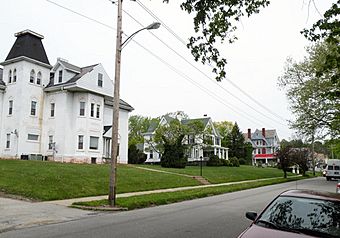East Washington Historic District facts for kids
Quick facts for kids |
|
|
East Washington Historic District
|
|

Looking down South Wade Avenue
|
|
| Location | Roughly North, East, and Wade Aves., Wheeling, Beau, and Chestnut Sts., East Washington, Pennsylvania |
|---|---|
| Area | 36.5 acres (14.8 ha) |
| Built | 1875 |
| Architectural style | Colonial Revival, Queen Anne, Shingle Style |
| NRHP reference No. | 84000547 |
| Added to NRHP | November 15, 1984 |
The East Washington Historic District is a special area in East Washington, Pennsylvania. It is recognized as a historic district because it has many old and important buildings. This district is listed on the National Register of Historic Places, which means it is protected for its history. The Washington County History & Landmarks Foundation also calls it a historic district.
What is a Historic District?
A historic district is a neighborhood or area with many buildings that share a common history or architectural style. These areas are important because they show us what life was like in the past. Protecting them helps us save history for future generations.
In 1984, a group called the Washington County History and Landmarks Foundation worked to get a part of East Washington recognized. This area included 120 Victorian-style houses. These houses were then added to the National Register of Historic Places.
The College and the District
Washington & Jefferson College is a university located nearby. The college had plans to grow its campus. These plans involved expanding into the area that became the historic district.
The college did not want the area to be named a historic district. They felt it would make it harder for them to expand. College President Howard J. Burnett said the district was set up to stop the college from growing.
Since 1968, the college had a "Master Plan" to expand eastward. This plan included buying properties near Wade Avenue. Over the years, the college has bought many homes in the district. Some of these buildings were taken down to make space for new college buildings, like the Burnett Center.
For example, a very old farmhouse from the 1800s was at 137 South Wade Street. The college bought it in 1977 and moved it to a new spot. By 1995, the college owned about 30 properties within the historic district.
Images for kids
- National Register nomination form
 | Jessica Watkins |
 | Robert Henry Lawrence Jr. |
 | Mae Jemison |
 | Sian Proctor |
 | Guion Bluford |




